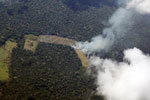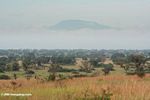Forests may be becoming more efficient in their use of water as atmospheric carbon dioxide levels rise, reports a new study in Nature.
The findings are based on data from 300 canopy towers that measure carbon dioxide and water flux above forests at sites around the world, including temperate, tropical, and boreal regions. The researchers found that plants are becoming more water efficient as CO2 levels rise. While the findings are consistent with forecasts using models, the rate of efficiency gain is higher than expected.
“This could be considered a beneficial effect of increased atmospheric carbon dioxide,” said Harvard University’s Trevor Keenan, the first author of the paper. “What’s surprising is we didn’t expect the effect to be this big.”

Forest in New Hampshire. Photos by Rhett A. Butler
Water is a byproduct of photosynthesis, the process by which plants convert sunlight and carbon dioxide into sugars. Mechanically, plants take in carbon dioxide and release water through tiny pores called stomata on their leaves. Higher CO2 levels “mean the stomata don’t need to open as wide, or for as long, meaning the plants lose less water and grow faster,” according to a statement from Harvard.
The research suggests that some forests may experience some benefits from rising CO2 levels.
“A large proportion of the ecosystems in the world are limited by water – they don’t have enough water during the year to reach their maximum potential growth,” said Keenan. “If they become more efficient at using water, they should be able to take more carbon out of the atmosphere due to higher growth rates.”

Rainforest in Costa Rica
But higher carbon dioxide levels could take a toll on some forests through increased temperatures, which can push plants toward a threshold where respiration rates increase at the expense of growth. Other research suggests tropical tree species may be particularly sensitive to temperature shifts. Furthermore, climate change is already causing shifts in rainfall patterns, triggering large-scale die-offs in some forests, like the American West and parts of the Amazon rainforest. Drought and higher temperatures, combined with human activities, can substantially increase the risk of fire as well.
These factors mean the authors are still taking a cautionary tone on the impact of rising carbon dioxide on forests.
“We’re still very concerned about what rising levels of atmospheric carbon dioxide mean for the planet,” said co-author Andrew Richardson — also of Harvard — in a statement. “There is little doubt that as carbon dioxide continues to rise – and last month we just passed a critical milestone, 400 ppm, for the first time in human history – rising global temperatures and changes in rainfall patterns will, in coming decades, have very negative consequences for plant growth in many ecosystems around the world.”
CITATION: Trevor F. Keenan et al. Increase in forest water-use efficiency as atmospheric carbon dioxide concentrations rise. Nature (2013) doi:10.1038/nature12291 Published online 10 July 2013
Related articles
Rising temperatures are triggering rainforest trees to produce more flowers
(07/09/2013) Slight rises in temperatures are triggering rainforest trees to produce more flowers, reports a new study published in the journal Nature Climate Change.
Rainforests will survive extreme global warming, argues study

(06/02/2013) Rainforests in South America have endured three previous extreme global warming events in the past, suggesting they will survive a projected 2-6 degree rise in temperatures over the coming century, reports a study published in the Annual Review of Earth and Planetary Science. The research, published by Carlos Jaramillo and Andrés Cárdenas of the Smithsonian Tropical Research Institute (STRI) in Panama, reviewed some 3,800 published estimates of temperature over the past 120 million years and compared them to the existence of tropical plants in the fossil record.
Rainforests may be more resilient to global warming – in isolation – than previously forecast
(03/11/2013) Tropical forests may be less sensitive to global warming than previously thought, argues a new study published in Nature Geoscience.
Will Amazon species lose the climate change race?

(02/14/2013) Deforestation could increase the risk of biodiversity loss in the Amazon by forcing species to migrate further in order to remain at equilibrium with changing climates, says new research. “As migration models are made more realistic through the inclusion of multiple climatic, biotic, abiotic and human factors, the predicted distances between current and future climate analogues invariably increases,” Kenneth Feeley, lead author of the paper published in Global Change Biology, told mongabay.com.
Rainforests may be more resilient to global warming – in isolation – than previously forecast
(03/11/2013) Tropical forests may be less sensitive to global warming than previously thought, argues a new study published in Nature Geoscience.
Will Amazon species lose the climate change race?

(02/14/2013) Deforestation could increase the risk of biodiversity loss in the Amazon by forcing species to migrate further in order to remain at equilibrium with changing climates, says new research. “As migration models are made more realistic through the inclusion of multiple climatic, biotic, abiotic and human factors, the predicted distances between current and future climate analogues invariably increases,” Kenneth Feeley, lead author of the paper published in Global Change Biology, told mongabay.com.
Borneo’s forests face dire future from global warming
(07/18/2012) Already wracked by extensive deforestation and forest degradation, the future looks grim for Borneo’s tropical rainforests, reports a new study published in the Journal of Geophysical Research-Biogeosciences.
Scientists slam Telegraph blogger’s claims that climate change will be good for the Amazon
(07/12/2012) Recent blog posts on The Telegraph and the Register claiming that tropical rainforests like the Amazon are set to benefit from climate change are ‘uninformed’ and ‘ridiculous’ according to some of the world’s most eminent tropical forest scientists. The posts, published Sunday and Monday by Tim Worstall, a Senior Fellow at London’s Adam Smith Institute, asserted that a new Nature study indicates that ‘climate change will mean new and larger tropical forests.’ But some of the world’s leading tropical forest experts took aim at Worstall’s logic, noting the limitations of the study as well as the other factors that are endangering rainforests.
Climate change could increase fires, logging, and hunting in rainforests

(03/13/2012) The combined impacts of deforestation and climate change will bring a host of new troubles for the world’s tropical rainforests argues a new study in Trends in Ecology and Evolution. Drying rainforests due to climate change could lead to previously inaccessible forests falling to loggers, burning in unprecedented fires, or being overexploited by hunters.
New meteorological theory argues that the world’s forests are rainmakers

(02/01/2012) New, radical theories in science often take time to be accepted, especially those that directly challenge longstanding ideas, contemporary policy or cultural norms. The fact that the Earth revolves around the sun, and not vice-versa, took centuries to gain widespread scientific and public acceptance. While Darwin’s theory of evolution was quickly grasped by biologists, portions of the public today, especially in places like the U.S., still disbelieve. Currently, the near total consensus by climatologists that human activities are warming the Earth continues to be challenged by outsiders. Whether or not the biotic pump theory will one day fall into this grouping remains to be seen. First published in 2007 by two Russian physicists, Victor Gorshkov and Anastassia Makarieva, the still little-known biotic pump theory postulates that forests are the driving force behind precipitation over land masses.
Deforestation, climate change threaten the ecological resilience of the Amazon rainforest
(01/19/2012) The combination of deforestation, forest degradation, and the effects of climate change are weakening the resilience of the Amazon rainforest ecosystem, potentially leading to loss of carbon storage and changes in rainfall patterns and river discharge, finds a comprehensive review published in the journal Nature.
Two massive droughts evidence that climate change is ‘playing Russian roulette’ with Amazon
(02/03/2011) In 2005 the Amazon rainforest underwent a massive drought that was labeled a one-in-100 year event. The subsequent die-off of trees from the drought released 5 billion tons of CO2. Just five years later another major drought struck. The 2010 drought, which desiccated entire rivers, may have been even worse according to a new study in Science, adding on-the-ground evidence to fears that climate change may inevitably transform the world’s greatest rainforest.
An undamaged Amazon produces its own clouds and rain
(09/21/2010) Researchers recently traveled to the remote Brazilian Amazon to investigate how clouds are formed and rain falls in an atmosphere unburdened by human-caused pollution. Studying the atmospheric aerosol particles, which impact cloud formation and particles, above a pristine forests, researchers discovered that when left alone the Amazon acts as its own ‘bioreactor’: clouds and precipitation are produced by the abundance of plant materials.
